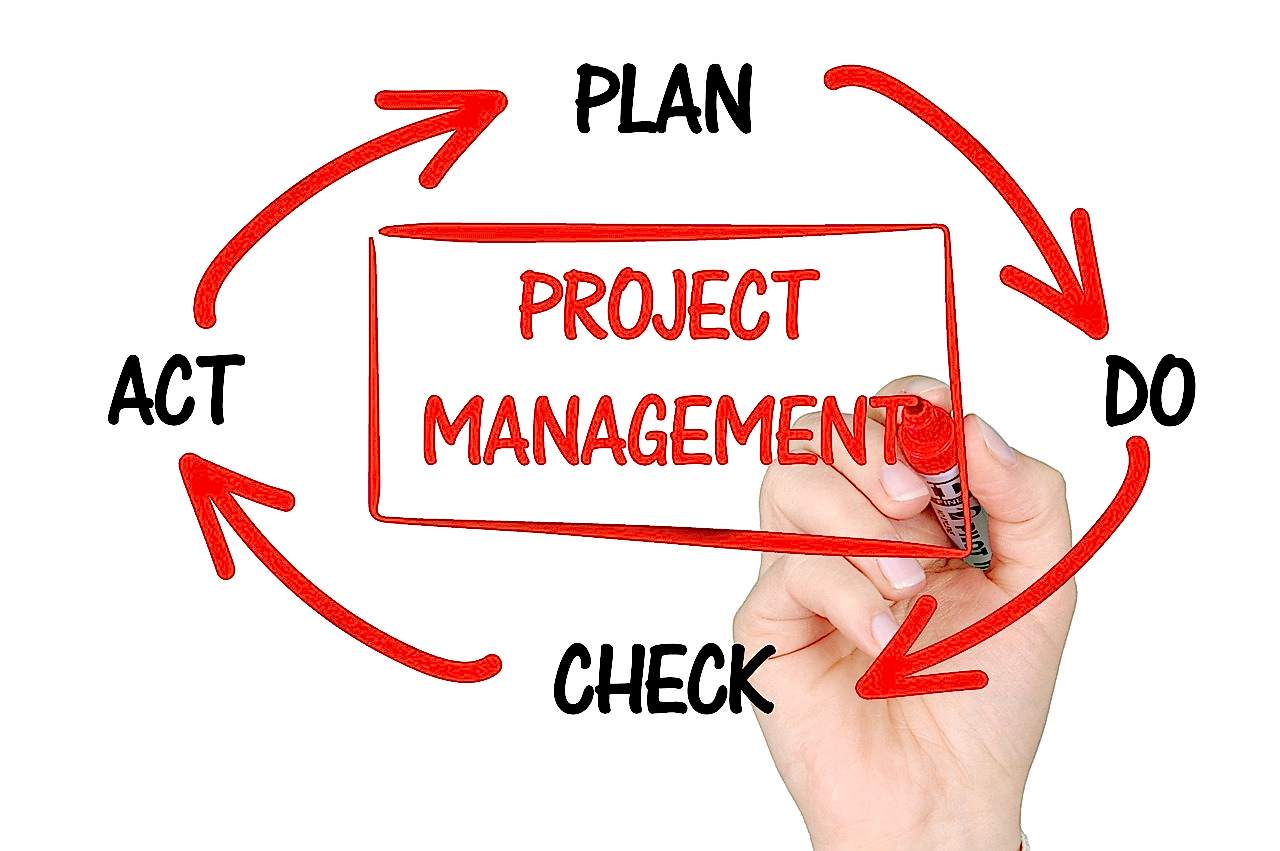Project management services play a pivotal role in the successful execution of projects across various industries. With their structured approach and expertise, project management services ensure that projects are completed within scope, on time, and within budget.
These services facilitate effective collaboration among team members, stakeholders, and vendors involved in the project. They foster a cohesive and coordinated approach, enabling seamless information sharing and decision-making throughout the project lifecycle.
Key Components of Project Management Services
Key Components of Project Management are the backbone of this discipline. Encompassing a range of essential elements that drive projects from inception to completion. These components form a cohesive framework that enables project managers to plan, execute, monitor, and control projects with precision, maximizing the chances of success.
Project Initiation: The starting point of any project involves defining objectives, scoping the project, and conducting feasibility studies. Project management services assist in developing project charters that outline project goals and align them with organizational strategies.
Project Planning: Effective planning sets the foundation for project success. Project management help create detailed project plans and schedules, identify deliverables and milestones, conduct risk assessments, and allocate resources and budgets appropriately.
Project Execution: Once the planning phase is complete, project management services facilitate the execution of project tasks and activities. They monitor progress, manage the project team and stakeholders, and implement quality control measures to ensure success.
Project Monitoring and Control: Continuous monitoring and control are vital to keep projects on track. Project management track project performance, conduct regular progress meetings, manage changes and issues, and ensure compliance with project standards and regulations.
Project Closure: The final phase involves closing out the project effectively. Project management services conduct project reviews, document lessons learned, hand over deliverables, and celebrate project success.
Types of Project Management Services
Project management services encompass a wide array of professional offerings tailored to meet the unique needs of projects. They provide organizations with the expertise, tools, and strategies to effectively plan, execute, and control projects, ensuring they are completed on time, within budget, and to the desired quality standards.
Traditional Project Management: Traditional project management follows a sequential approach, often called the waterfall methodology. It involves clearly defined project phases and linear progression.
Agile Project Management: Agile project management, characterized by flexibility and adaptability, is gaining popularity. The Scrum methodology, one of the most widely used agile approaches, employs iterative and incremental cycles for project delivery.
Hybrid Project Management: Hybrid project management combines traditional and agile methodologies. It allows project managers to tailor approaches based on project requirements and select the most suitable tools and techniques.
Roles and Responsibilities in Project Management Services
At the core of project management lies the responsibility of a project manager, a visionary leader responsible for guiding the team toward project success. They possess a multifaceted skill set, including strategic planning, risk management, resource allocation, and effective communication. The project manager serves as the linchpin, orchestrating the efforts of team members, managing stakeholders’ expectations, and overseeing the project’s progress from initiation to closure.
Beyond the project manager, project management services involve diverse roles. From the project sponsor, who provides the necessary resources and support, to the project team members who execute the tasks and deliverables, each role brings unique expertise and contributes to the project’s collective success. Additionally, stakeholders, clients, and end-users play integral roles in project management, providing input, feedback, and guidance throughout the project lifecycle.
Project Manager: The project manager is crucial in project management services. They provide leadership, make decisions, plan and organize project activities, and effectively communicate with stakeholders.
Project Team Members: Team members contribute their technical expertise to execute project tasks, coordinate with other team members, and ensure collaboration and communication throughout the project lifecycle.
Project Stakeholders: Stakeholders are individuals or groups affected by the project. Project management services help identify and engage stakeholders, address their needs and expectations, and manage relationships throughout the project.

Tools and Software for Project Management Services
Gone are the days of cumbersome spreadsheets, endless email threads, and missed deadlines. With the help of these cutting-edge tools, you can centralize all project-related information, track progress in real-time, and keep everyone involved in the loop. From simple task management to complex project planning, these tools are designed to adapt to your unique needs and scale alongside your business growth.
But it’s not just about project management efficiency. These tools also enhance communication and collaboration within your team, breaking down silos and fostering a collaborative work environment. You can easily assign tasks, set priorities, and monitor progress, all while fostering open communication and transparency.
Project Planning and Scheduling Tools: Gantt charts, Critical Path Method (CPM), and Kanban boards are widely used for visualizing project timelines, dependencies, and resource allocation.
Communication and Collaboration Tools: Project management software, team messaging platforms, and document-sharing tools enable effective communication, collaboration, and version control among project stakeholders.
Project Reporting and Tracking Tools: Project dashboards, time-tracking software, and issue and risk-tracking systems provide real-time visibility into project progress, resource utilization, and potential risks.
Challenges in Project Management Services
Projects operate within constraints, be it budgetary limitations, time restrictions, or scarce talent pools. Optimizing the utilization of available resources and making informed decisions regarding their allocation is a constant juggling act for project managers. Striking the right balance between quality, cost, and time can be arduous, requiring astute decision-making and proactive risk management.
In the face of these and many other challenges, project managers rely on their expertise, adaptability, and strong leadership skills to steer projects toward triumph. They must be adept communicators, adept at fostering collaboration, and capable of motivating team members to deliver their best work. Moreover, they must embrace a forward-thinking mindset, staying abreast of emerging industry trends, best practices, and technological advancements that can streamline project management processes.
Scope Creep and Changing Requirements: Managing evolving project scope and changing requirements is a common challenge. Project management help establish effective change management processes to control scope creep.
Resource Allocation and Management: Optimally allocating and managing human resources, equipment, and materials, is essential for project success. Project management services ensure efficient resource utilization throughout the project lifecycle.
Communication and Coordination: Effective communication and coordination among team members, stakeholders, and project managers are critical for project success. Project management establish robust communication channels and facilitate collaboration.
Risk Management and Mitigation: Identifying and mitigating risks throughout the project is vital. Project management services conduct thorough risk assessments, develop mitigation strategies, and monitor risks proactively.
Balancing Quality, Time, and Cost Constraints: Project management services balance project quality, time constraints, and budget limitations. They employ strategies to optimize project outcomes while considering these constraints.

Best Practices for Effective Project Management Services
No matter the size or complexity of your projects, these best practices will provide you with a solid foundation for success. Following these guidelines, you can navigate potential challenges, minimize risks, and deliver projects that meet or exceed stakeholders’ expectations.
Clear Project Objectives and Scope Definition: Defining clear project objectives and scope at the outset ensures a shared understanding among all stakeholders.
Robust Project Planning and Scheduling: Creating detailed project plans, including work breakdown structures and realistic timelines, enables effective resource allocation and task management.
Effective Communication and Stakeholder Management: Regular and transparent communication with stakeholders fosters trust, aligns expectations, and promotes collaboration.
Regular Project Monitoring and Reporting: Monitoring project progress, tracking key performance indicators, and reporting milestones are crucial for effective project management services.
Continuous Improvement and Lessons Learned: Project management services encourage a culture of continuous improvement by capturing and sharing lessons learned from past projects.
Case Studies and Examples of Successful Project Management Services
Case studies provide insights into successful project management methodologies and approaches used by organizations. By studying these examples, you can identify best practices, such as effective communication strategies, risk management techniques, stakeholder engagement methods, and more.
Large-scale Construction Projects: These services have been instrumental in the successful completion of large infrastructure projects, such as bridges, airports, and stadiums, by coordinating multiple stakeholders and managing complex timelines.
IT System Implementation Projects: Project management ensure the smooth implementation of IT systems by aligning technical requirements with business objectives, coordinating testing and training activities, and mitigating risks.
Product Development Projects: From ideation to product launch, project management services support product development projects by managing cross-functional teams, optimizing resource allocation, and adhering to project timelines.
Event Management Projects: Organizing successful events requires meticulous planning and coordination. Project management services help manage event logistics, stakeholder coordination, and risk mitigation to deliver memorable experiences.

Conclusion
Project management services are indispensable for driving project success. Consider the key components, using suitable methodologies, and adopt best practices to pave the way toward managing a project. Project management ensure efficient utilization of resources, effective communication, and timely delivery of project outcomes. As organizations increasingly embrace project management, they can anticipate improved project performance, increased stakeholder satisfaction, and enhanced overall organizational success.
Read More: Key Elements of Effective SEO Services

FAQs
Project management are essential for ensuring the successful execution of projects. They help organizations effectively plan, organize, and control project activities, ensuring that projects are delivered on time, within budget, and according to predefined quality standards. Project management provide structure, minimize risks, and maximize the chances of project success.
Project management services bring numerous benefits to organizations. They help optimize resource allocation, streamline processes, enhance communication and collaboration, minimize project risks, improve decision-making, and meet project objectives. Additionally, project management services enable organizations to adapt to changes, handle complexities, and achieve higher project efficiency and effectiveness levels.
Project management services apply to various industries, including construction, information technology, healthcare, engineering, marketing, finance, etc. Any industry undertaking projects can benefit from project management services to ensure smooth project delivery and successful outcomes.
Selecting the right project management services provider is crucial for project success. Organizations should consider factors such as the provider’s experience, expertise in specific industries, track record of successful projects, certifications, client testimonials, and the ability to align with the organization’s goals and culture. It is also important to assess the provider’s communication skills, project management methodologies, and availability of appropriate resources.
Yes, project management services can be customized to meet the unique needs of specific projects. Different projects may require different approaches, methodologies, and tools. A professional project management services provider should be able to tailor their services to fit the specific requirements of each project, ensuring optimal project outcomes.
Project management services include risk assessment and management as a key component. Project managers identify potential risks, analyze their impact, and develop strategies to mitigate or address them. Through effective risk management, project management services help minimize the likelihood of risks occurring and reduce their potential impact on project objectives.
Project management services are crucial in project recovery or rescue situations. When a project faces challenges or is at risk of failure, project management services assess the situation, identify root causes, develop recovery plans, and implement corrective actions. Their expertise in project management methodologies and experience handling complex situations can help turn around troubled projects and bring them back on track.
No, project management services are not limited to large-scale projects. While they are commonly associated with complex and larger projects, project management services are equally valuable for small and medium-sized projects. Regardless of project size, effective project management services can enhance project outcomes, improve efficiency, and ensure successful delivery.
Absolutely! Project management services can be seamlessly integrated with other organizational business processes and functions. Effective project management requires collaboration with stakeholders, alignment with organizational goals, and integration with procurement, human resources, finance, and quality management. Integration of project management services enables cohesive project execution and facilitates efficient utilization of resources and capabilities.


Pingback: Dropshipping vs Ecommerce: Which One is better? - Digital Marketing Agency in Islamabad-Pakistan